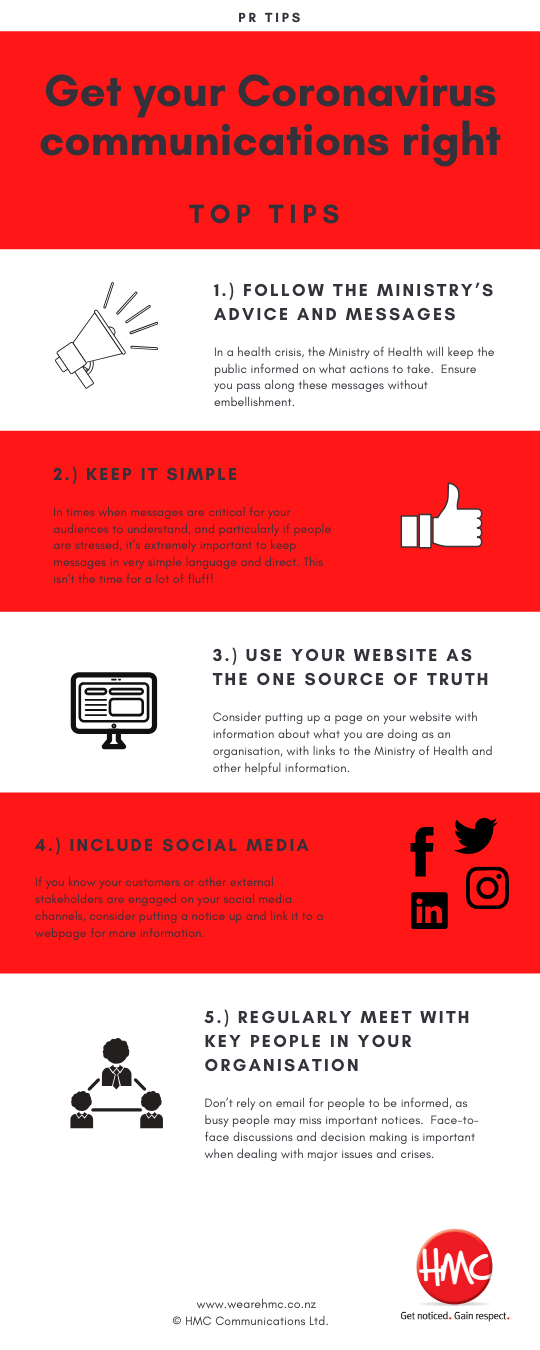I think we all hoped New Zealand wouldn’t be hit by Coronavirus (Covid-19) again, but it has infiltrated our shores once more. Auckland region is in Level 3 and the rest of the country in Level 2, which means we will all be working a bit differently with tighter regulations around social distancing.
Here’s a reminder from a blog post we did in February on how to get your ‘covid comms’ right as your business navigates its way through:
1. Follow the Ministry’s advice and messages – In a health crisis, the Ministry of Health will keep the public informed on what actions to take. Ensure you pass along these messages without embellishment. We’ve also found the World Health Organisation has some great resources you can download and use, like posters for public areas.
2. Keep it simple – In times when messages are critical for your audiences to understand, and particularly if people are stressed, it’s extremely important to keep messages in very simple language and direct. This isn’t time for a lot of fluff!
3. Use your website as the one source of truth – If you haven't already, consider putting up a webpage on your website with information about what you are doing as an organisation with links to the Ministry of Health and other helpful information. Then, use this webpage as the one source of truth that you update as you have further information. Then, your email, text, or social media updates to staff and stakeholders can be short and include a link to the website for more information. If you only need to keep staff informed, you may choose to create a page on your intranet or other internal, shared channel.
4. Translate into different languages – If your audience is made of people where English is their second language, get your communications translated into key languages.
5. Tell your staff first, stakeholders second and make any public messaging last – Prioritise your audiences and ensure you tell them important messages in the right order.
6. Include social media if your audiences are engaged online – If you know your customers or other external stakeholders are engaged on your social media channels, consider putting a notice up and link it to a webpage for more information.
7. Update regularly, even if there’s not much more to say – It's important to communicate with your audiences often. Even if there’s not much more to say, provide regular updates to assure people your organisation is managing the situation and in control (as much as you can be!). We have all seen first-hand how rumour and conspiracy will fill the gap if you aren't filling it with facts and updates.
8. Regularly meet with key people in your organisation – Consider forming a working group and meeting often. How often will be different for different organisations and could be daily, twice weekly or ad hoc as more information comes to hand. Don’t rely on email for people to be informed, as busy people may miss important notices. Face-to-face discussions and decision making is important when dealing with major issues and crises.
9. Be flexible - No one likes a plan more than myself. But, in times like this the situation is changing daily. The communications you planned yesterday, can be outdated today. So, remain flexible and be ready to move fast.
10. Bring compassion and care - Remember that for many people, self-isolating or just working more from home can be stressful. Ensure conversations with staff and colleagues isn't just about business. Take the time to ask people how they are doing, be kind, compassionate and offer grace when stress creeps in.
This certainly isn’t and exhaustive list of Coronavirus communications tips, but it should help you get started. And if you need help, give the HMC team a call!
Infographic
Feel free to share our infographic but ensure to include attribution to https://www.wearehmc.co.nz/.
